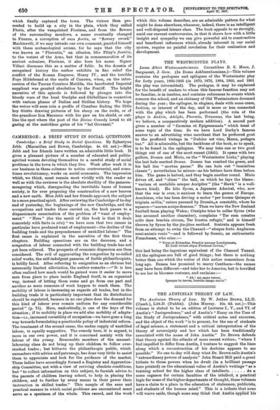CAMBRIDGE: A BRIEF STUDY IN SOCIAL QUESTIONS.
Cambridge a Brief Study in Social Questions. By Eglantyne Jebb. (Macmillan and Bowes, Cambridge. 45. gd. net.)—Miss Jebb and her friends have written an admirable little book. It gives a pleasant picture of a number of educated and public- spirited women devoting themselves to a careful study of social problems in the town in which they live. Week after week it is our business in these columns to notice controversial, and some- times revolutionary, works on social economics. The impression which, we think, must remain most vividly with the reader as well as with the reviewer is the absolute sterility of the panacea- mongering which, disregarding the inevitable bases of human society, is for ever proposing the construction of a new heaven and a new earth. Miss Jebb and her friends approach the subject in a more practical spirit. After reviewing the Cambridge of to-day and of yesterday, the beginnings of the new Cambridge, and the occupations and trades there carried on, the book passes to a dispassionate examination of the problem of "want of employ- ment." " Here " (for the merit of this book is that it deals concretely with facts in situ) "we have seen that two causes in particular have produced want of employment—the decline of the building trade and the preponderance of unskilled labour." The first cause is explained in the narrative of the first three chapters. Building operations are on the decrease, and a congestion of labour connected with the building trade has not yet been relieved. The prospects of economic dispersion are then considered. The evil of aggravating the congestion by so-called relief works, the self-indulgent panacea of feeble philanthropists, is boldly faced. After referring to emigration as an obvious but necessarily limited alleviation, the author remarks :—" It is less often realised how much would be gained were it easier to move men from place to place inside England itself, in an organised way, instead of letting them come and go from one part and another as mere rumours of work happen to reach them. The mobility of labour is increasing as regards all trades, but in the building trade it is particularly important, that its distribution should be regulated, because in no one place does the demand for this kind of labour ever remain uniform for any considerable period" (p. 76). Here, undoubtedly, is one of the keys of the situation ; if to mobility in place we add also mobility of adapta- tion—i.e., increased versatility of occupation—we have gone a long way towards formulating a practicable policy of industrial reform. The treatment of the second cause, the undue supply of unskilled labour, is equally suggestive. The remedy here, it is argued, is more in our own power, and it is concerned mainly with the labour of the young. Reasonable members of the manual- labouring class do not bring up their children to follow over- stocked trades ; but hitherto the philanthropic public, which encumbers with advice and patronage, has done very little to assist them to appreciate and look for the guidance of the market. These ladies have accordingly formed a Registry and Apprentice• ship Committee, not with a view of reviving obsolete conditions, but "to collect information on this subject, to furnish advice to the parents of children leaving school, to help in placing the children, and to further by every means in their power their instruction in skilled trades." This sample of the sane and practical manner in which social problems are encountered must serve as a specimen of the whole. This record, and the work which this volume describes, are an admirable pattern for what might be done elsewhere, wherever, indeed, there is an intelligenrt and well-disposed leisure class. The book appeals to us strongly, amid our current controversies, in that it shows how with a little insight and sympathy we can give powerful aid to constructive and beneficent influences which, already inherent in our social system, require no painful revolution for their realisation and development.


























































 Previous page
Previous page